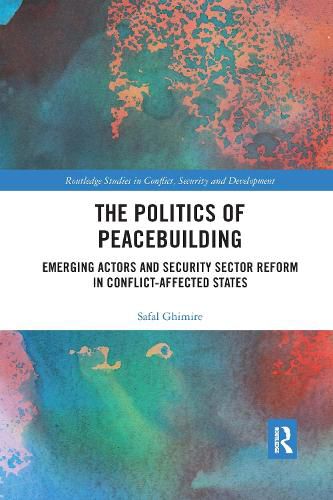Readings Newsletter
Become a Readings Member to make your shopping experience even easier.
Sign in or sign up for free!
You’re not far away from qualifying for FREE standard shipping within Australia
You’ve qualified for FREE standard shipping within Australia
The cart is loading…






This book examines and compares the diverging security approaches of the UK, China and India in peacebuilding settings, with a specific focus on the case of Nepal.
Rising powers such as China and India dissent from traditional templates of peacebuilding and apply their own methods to respond to security issues. This book fills a gap in the literature by examining how emerging actors (China and India) engage with security and development and how their approaches differ from those of a traditional actor (the UK).
In the light of democratic peace and regional security complex theories, the book interprets interview data to compare and contrast the engagement of these three actors with post-war Nepal, and the implications for security sector governance and peacebuilding. It contends that the UK helped to peacefully manage transition but that the institutional changes were merely ceremonial. China and India, by contrast, were more effective in advancing mutual security agendas through elite-level interactions. However, the ‘hardware’ of security, for example material and infrastructure support, gained more consideration than the ‘software’ of security, such as meritocratic governance and institution building.
This book will be of much interest to students of peacebuilding, development studies, Asian politics, security studies and International Relations in general.
$9.00 standard shipping within Australia
FREE standard shipping within Australia for orders over $100.00
Express & International shipping calculated at checkout
This book examines and compares the diverging security approaches of the UK, China and India in peacebuilding settings, with a specific focus on the case of Nepal.
Rising powers such as China and India dissent from traditional templates of peacebuilding and apply their own methods to respond to security issues. This book fills a gap in the literature by examining how emerging actors (China and India) engage with security and development and how their approaches differ from those of a traditional actor (the UK).
In the light of democratic peace and regional security complex theories, the book interprets interview data to compare and contrast the engagement of these three actors with post-war Nepal, and the implications for security sector governance and peacebuilding. It contends that the UK helped to peacefully manage transition but that the institutional changes were merely ceremonial. China and India, by contrast, were more effective in advancing mutual security agendas through elite-level interactions. However, the ‘hardware’ of security, for example material and infrastructure support, gained more consideration than the ‘software’ of security, such as meritocratic governance and institution building.
This book will be of much interest to students of peacebuilding, development studies, Asian politics, security studies and International Relations in general.